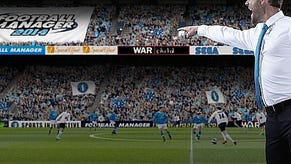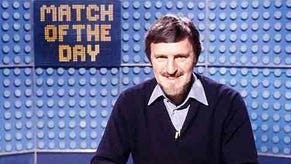Wot I Think: Football Manager 2013 Classic
Streamline Technology
Forget about the media, forget about team talks. This is a tale of men, balls and boots. Football Manager Classic, a mode within FM 2013, goes back to basics. But is it actually classic, or is it more like one of those movies that nobody likes but that inexplicably finds itself in a ‘Classics’ range when it's released on DVD?
I’m not going to write just shy of two thousand words about the full Football Manager experience this year, primarily because I haven’t been able to find a spare hundred hours or so to dig beneath the turf. Instead, I’ve been spending the wee small hours with the Classic version since I figure people may be interested to know how it works, or whether it does at all.
Although it purports to be a return to the glory days of jumpers for goalposts, there was a fear that it might be more like the handheld version on a larger screen. The good news is that it’s certainly not the latter. The bad news is that it feels very much like the first iteration of an excellent idea. That’s not to say it’s a failure – it’s been infringing dangerously on my social life since the beta – but there are issues and some of them run through the entire game, not just the Classic mode.
This is the plan. First of all, some discussion of the three ‘t’s: tactics, training and transfers. Following that, thoughts on the features that Classic leaves out and whether streamlining seems more like amputation. Finally, there’ll be a look at the new match engine, which is relevant to the full-fat game as well as the Classic mode. A quick preview of that last part: it’s the best match engine Sports Interactive have designed and it’s almost definitely quite a bit broken as well. Internal critical conflict, ahoy.
If you would care to, now is the time to unleash all the mocking laughter that you've stored up throughout the day. Release it in my direction as I inform you that the first thing I noticed about Classic mode is that it’s very handsome. Admiring the smooth skin of a game about spreadsheets and tiny ogre-men is a sure way to invite guffaws of derision, but this truly is the smoothest skin of all. Information is rarely more than a click away thanks to extensive linkage and screens are divided neatly into smaller windows, prioritising important data. If the Classic skin were a new operating system, sensible people would say, ‘oh, what a clever and unobtrusive interface’.
The Classic interface doesn’t have as much to do as its forefathers, which is certainly part of the reason it looks so trim. Tactics, training and transfers are the order of the day. That’s what you’re responsible for as a classic mode manager. Tactics can be worked on between matches and adjusted before them. Apart from the bizarre loss of sweepers, there aren’t many changes. Set a formation, either from a drop down menu or by positioning players individually, and then assign roles and a focus for each position. Team and player instructions are all familiar – type of passing, pressing, creative freedom etc. There are no specific opposition instructions, although it is possible to set individual marking from the touchline.
These are the screens I spend most of my time on and if you’re less of a tactical tweaker than me, the pre-release claims were correct – in Classic mode it’s possible to complete a season in an evening. There’s an instant result option for matches and a method of programming your team to make formation and tactical shifts at certain points, or when the scoreline changes.
I’m not hands-off enough for that and I tend to tinker while watching comprehensive highlights so it still takes me a week to finish off a season. The media actually refer to me as ‘The Tinkerer’ (caps mine), which makes me feel like a managerial supervillain. Tinkerer Comes Undone, they wrote just last night, which led to me cursing Stevenageman and his obstinate and unbreakable 5-1-3-1.
Speaking of the media, interactions with the press are almost entirely gone, with just the occasional question after a big game or signing, and there are no team talks or individual character interactions either. The other area that often takes up a great deal of time in my games is dealing with the backroom staff and that’s another area that has been hollowed out almost entirely. Quite simply, you don’t have to worry about them. Assistant managers will still offer advice before and during games, but scouting is simple – perhaps too simple.
A scout can be assigned to find new talent in any region permitted by club location or finances, or to look through his previously constructed lists of players to find those that fit specific criteria. That’s it. At a smaller club – I’ve mainly been playing with Bournemouth having started as an unemployed wastrel – it’s possible to get through an entire season without clicking on the scout at all. My chap was in Scotland, presumably just eating chips for a year. Good on him, I say, at least he wasn’t wasting my time with reports on players I couldn’t afford and didn’t want.
It won’t be enough for some people and at higher levels it does seem more jarring, although it is possible to bring in a Director of Football to handle transfers and contracts, just as in the full sim mode. Training is slight as well, which I’m thankful for. There are no individual assignments, just options for the team workload and focus.
The biggest loss isn’t a feature as such, it’s the restriction on leagues and nations. In Classic mode, every game has three nations with all of their leagues loaded. Apparently this has been done in order to keep the game running fast but anyone with a decent PC could run far more leagues without increasing loading times significantly. It seems a strange choice and is oddly the only part of Classic mode that does seem to be copied directly from FM Handheld.
As I bemoaned my inability to find a job in some obscure European league (although it is still possible to add/remove nations as long as there are only three at any one time) I realised that the absence of other features I was glad to see the back of would frustrate some people. The future of the series could be in a mode that allows features to be selected by the player, creating their own version somewhere between the two poles that FM 2013 offers. The simulation seems just as complex and impressive in Classic, so a middle ground does seem possible.
And so onto the match engine. The simulation of the world is more complex and brilliantly conceived than ever and at first matches seem to play out with more variety and realism than ever before. Sure, animations are still simple and there’s some unexpected slipping and sliding – yes, the ball often pings off crossbars and goalkeepers’ fists with a frightening amount of velocity – but players exert closer control of the ball, guarding it, and twisting through defences. But after a few games the illusion beings to crumble like a cheap biscuit in a cup of hot bovril and it’s because every team in the world has turned into an ultra-patient attempt-to-be-Barcelona. Or perhaps Brendan Rogers spilled his philosophy into the programmers' tea.
Players have an uncanny urge to pick out a pass, no matter where they are on the pitch and no matter what their mentality. They pass sideways more than they pass forwards and backwards almost as much as either. It’s not that they’re always successful and I don’t think it skews results a great deal once player-controlled managers understand how to adjust to the style, but there are some squads that suit the passing play more than others and they do seem to land higher than expected. The core of the problem is that a league two side will sometimes string together forty passes in patient build-up around the box, passing back to the midfield, pulling their opponents out of position, looking for an opening. It just doesn’t happen in the real world – certainly not in almost every match.
It’s such a shame because so much else is so right. Goals are far more varied, fouls and tackles far more believable and goalkeepers more unpredictable, even if the latter do save with their legs a bit too often.
Sports Interactive have promised a patch, which suggests they’re aware of the problem. Hopefully the ‘patience problem’, as I’m calling it, is due to a slightly imbalanced probability in what must be an incredibly complex bible of code. As it stands, it hasn’t spoiled the game for me, but it does mean my Bournemouth play football that works in FM 2013 rather than anything resembling what they would play in the real world. In such a careful and clever simulation, that’s far from ideal.
Classic mode is strong though. It cuts out the nonsense without damaging the simulation and I don’t feel like I’ve given up a huge amount of control. Although I'll probably switch to the full version after the January update, it’s a relief to be more fixated on the actual results of a football match than the results of a press conference. I’d be ecstatic if the actual Premier League had a Classic mode as well. I expect someone will comment that I'd find such a thing in the lower leagues, where men talk with their feet instead of their agents. I won't argue.
Oh, and if you're bothered by the real money unlockables, fear not. Some of them are basically cheat codes and the others are things like having your son join the team as a generated player, which happens during a career under certain circumstances anyway. I don't like that a full price game has a store inside it but since its wares are so meaningless, I've quickly learned to ignore it.
Football Manager 2013 is available now. I'll take a closer look when the match engine patch(es) arrive and see how much changes.


















